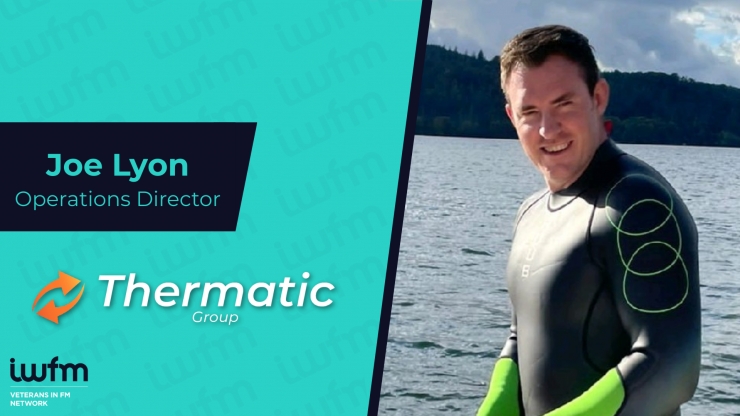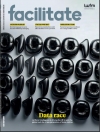IWFM Veterans in FM Network interview with Joe Lyon, Thermatic Technical FM

IWFM Veterans in FM Network Interview - Joe Lyon, Ops Director at Thermatic Technical FM
Michelle Connolly, Co-Founder and Director of 300 North and Committee Member of IWFM Veterans in FM Network had the pleasure of speaking with Joe Lyon, Operations Director at Thermatic Technical FM, who shares his journey from military service to senior leadership in FM. His story is a brilliant example of how the skills gained in the forces - leadership, adaptability, operational excellence etc translate so well into our industry.
Below is the interview transcript, but be sure to check out the full video on the IWFM Youtube here: https://www.youtube.com/watch?v=69E8w2HL5lg
- What was your career journey from the RAF to Facilities Management (FM)?
- Which skills from your military service were most valuable in FM?
- What services does Thematic Technical FM provide, and how do you differentiate from larger providers?
- What advice do you have for service leavers and veterans exploring a career in FM?
- What trends do you see shaping the future of Facilities Management beyond 2025?
Michelle: Welcome to our Careers in FM Series. I'm Michelle Connolly, here today representing the IWFM Veterans in FM Committee. It's great to welcome Joe Lyon, Operations Director of Thermatic Technical FM.
Good morning, Joe. Thnks for joining us today.
Joe, you spent 14 years in the RAF, so it'd be really great to start by hearing about your own career journey. I know you worked for a project-based organisation prior to coming into FM, so it'd be interesting to hear how that experience helped your transition and move through to FM as well.
Joe: Yeah, of course. You're quite right, I spent 14 years in the Royal Air Force. I joined at the tender age of 16, straight from school, transitioned through basic training, and started out my apprenticeship as an aircraft engineer with a specialisation in weapons engineering.
I worked with the Harriers during mobilisation through Afghanistan. Over time, I moved on to the Typhoon, working with the weapons evaluation unit and then support units. I also did various tours outside of aircraft engineering, like EOD and supply roles. Towards the end of my career, I moved into air traffic control, working in aviation safety for a couple of years before finishing my service.
I joined in 2003, actually. Yesterday was my 22nd anniversary, the 12th of February 2003. I left on my 30th birthday after 14 years. It’s a long time, but I loved every minute of it. It taught me a lot and really shaped who I am today, giving me a good grounding for transitioning into the civilian world.
After leaving, I joined a maintenance service provider in the water industry. I started as a site manager or team leader for field-based engineers providing maintenance service packages for United Utilities, Yorkshire Water, Severn Trent, and the like.
We grew and diversified the business from heavy mechanical equipment into preventative maintenance - similar to FM but something that didn’t really exist in that industry at the time. I was there from 2016 to late 2022, about six years.
Then, at the start of 2023, I joined Thermatic Technical as the Project Director, heading up projects. That’s where I really began my FM-specific journey within the built environment. I’ve been here since early 2023, growing the projects division, and then moving across to Operations Director, where I now lead a team of 100+ engineers and 60+ office staff across a nationwide platform. It's been a fast-paced journey.
Michelle: We’ll definitely talk more about Thermatic. But as you mentioned that transition, it’d be interesting to understand what skills and experiences from your military service you found most valuable coming into FM.
Joe: FM is a funny industry - everybody knows each other, and there's this client/subcontractor divide. One of the biggest skills is collaboration - building relationships and removing the transactional aspect.
In the military, it wasn’t transactional. It was camaraderie; we had a job to do and did it collectively, regardless of which branch you were in. That mentality carries over well because FM can still be quite transactional for some. That team-focused approach helps break that barrier.
Michelle: Absolutely. I’ve found FM to be a very friendly and helpful sector, especially coming in from outside. Relationships are so important. Let’s talk a bit more about Thermatic - what services do you provide, and how do you differentiate yourselves from the bigger providers?
Joe: Great question. We just revisited our vision, mission, and values because they didn’t reflect who we are today. Our vision is "To be the difference within the facilities management sector." It’s open to interpretation, and that’s deliberate - it allows us to align it with everyone in the business.
FM isn’t just technical - it includes procurement, planning, scheduling, and more. Our differentiator is our investment in people. We trust, invest in, and build teams that attract others into the business. If someone reaches a natural ceiling here and wants to move on, we support that too-even outside Thermatic.
We also see a labour gap coming in engineering, so we're investing heavily in apprenticeships. We want engineers - even those not working here-to view Thermatic as a positive presence in the industry.
Michelle: And for those watching who may not know what FM is - especially service leavers - what sort of services does Thermatic provide?
Joe: Thermatic Technical is a hard FM service provider, focusing on M&E (mechanical and electrical) and HVAC. That’s our bread and butter. We also offer broader services like building fabric maintenance and drainage. We recently acquired a drainage company to expand our offering.
For service leavers - don’t get hung up on not being an air conditioning engineer. You can come into FM through contract management, procurement, planning, etc. FM is big enough to let you find your path.
Michelle: Yes, many service leavers struggle to see how their military training translates. What advice would you give - certifications, networking, etc.?
Joe: When I left, I was unsupported and had to figure it out. That doesn’t work for everyone. So if you’re within 18 months of leaving, start building a network. FM is vast and flexible, so it's a great choice.
Reach out - people like me are happy to give 10 minutes of guidance. Use LinkedIn - build your profile, and demilitarise it. Translate your military team leader experience into civilian terms. Speak the language employers want to hear. It should be a part of your story, but not all of it. Don’t lean solely on it, but don’t hide it either. Be proud of it—it gets attention. But then you need to translate that experience to what people in the industry want to hear. Read job descriptions and match them with your transferable skills.
Michelle: That’s so important. Some people are reluctant to even mention their military background, but I think it should be a positive - resilience, leadership, and more. Any thoughts?
Joe: It should be a part of your story, but not all of it. Don’t lean solely on it, but don’t hide it either. Be proud of it—it gets attention. But then you need to translate that experience to what people in the industry want to hear. Read job descriptions and match them with your transferable skills.
Michelle: We talked a bit about recruitment challenges. Can you expand on how you’re opening the talent pool for Veterans and emerging talent?
Joe: We’ve signed the Armed Forces Covenant and launched Operation Pathway, an internal initiative targeting service leavers. No hidden agenda - we just want to help them transition, then support whatever direction they choose.
We’ve worked with the Career Transition Partnership, attended events like the BR workshop, and got a lot of traction.
The challenge is that many don’t understand what SMEs like us are or where we stand in the industry. They gravitate toward the big names - CBRE, Mitie, Vinci—because they feel more secure. But SMEs like Thermatic can offer quicker decisions, direct leadership, and closer support. Don’t overlook them.
Michelle: And in terms of industry trends - why is FM exciting in 2025 and beyond?
Joe: FM is at the forefront now with Net Zero. We’re doing work with CIBSE on decarbonization. FM is evolving from simply maintaining buildings to optimizing and understanding them - efficiency, smart tech, integration with AI.
In new builds, tech is changing fast - air source heat pumps, solar, BMS, intelligent buildings, even semi-off-grid systems. The AI transformation within FM is going to explode when the tech matures. There’ll be huge opportunities.
Michelle: Final thoughts - anything important you’d like to add?
Joe: Be confident. Your military background - whether 1 year or 22 - puts you ahead. People notice it. Your challenge is translating it to what the hiring manager wants to hear. Answer the job description, show your transferable skills. Back yourself.
Michelle: Thank you, Joe. A lot of service leavers do lack confidence, and it's great to hear how they can build that. Thanks so much for sharing your journey with Thermatic and your insights into FM today.
Joe: Thanks, Michelle. Cheers.








